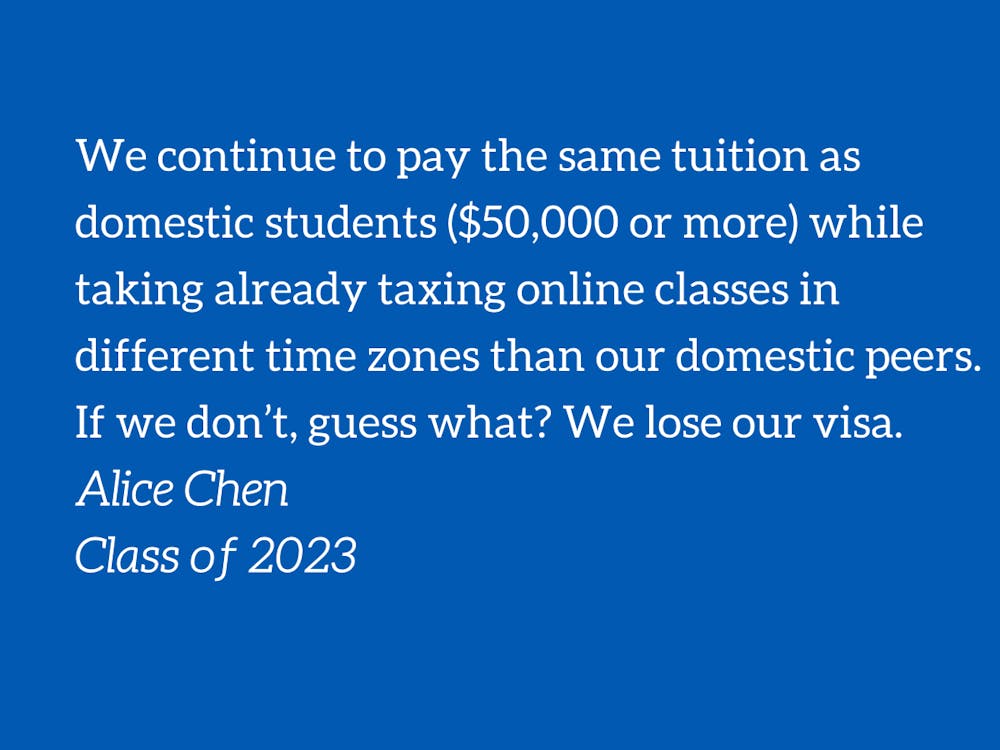Kaijie Zhang, a first-semester student at Rensselaer Polytechnic Institute, passed away this February when he was studying remotely from his home in Wuxi, Jiangsu, China. Media outlets in China reported that his death was likely caused by “the irregular routine." Indeed, with the 12-hour difference between New York and Beijing, students in China often stay up unreasonably late for synchronous “afternoon” seminars that count “attendance” as part of the grade.
I experienced “the irregular routine” myself after going back to China last March. Since I had three seminar classes that required synchronous attendance, I had to take classes 10 p.m. to 3 a.m. two days a week. It was exhausting. When I scrolled through fall classes last summer, the situation stayed almost unchanged. Most seminars at Duke were still in the early afternoon (which is midnight in China). I didn’t think I would enjoy an academic discussion at 3 a.m. and eventually decided to take a semester off. It seemed like a good option. Yet, little did I know, that was only the beginning of my trouble.
I called the U.S. Consulate in Shanghai and they notified me that a Leave of Absence means the termination of not only my I-20 (a document required to attend an American university as an international student), but also my five-year F-1 visa stamp, which I got in 2019.
For those of you who are unfamiliar, here is the process an international student must go through before they can enter the country: first, they need an F-1 visa. In order to get an F-1 visa, a student must make an appointment with the U.S. Consulate and complete an interview. If this goes well, and the student gets the five-year visa stamp, the student must then submit all documents to the school to obtain an I-20 form.
However, since COVID broke out in March 2020, U.S. Consulates worldwide have suspended routine visa services. Although Consulates are now accepting appointments in certain regions, in many countries including China and India, all Consulates are still open to “emergency appointments only." This means at the time that I, a Chinese student who won’t be able to make a visa appointment to obtain a new visa in the foreseeable future, was trapped at home as well. The uncertainty looming over whether I could enter the U.S. using the current visa stamp made it impossible to move forward with any plans — semester housing, internships, classes and more.
In fact, the frustrations and confusions I experienced with the F-1 visa issue are shared by hundreds of thousands of international students. No incoming international students in Class of 2024 and 2025 from countries like Turkey can enter the U.S because they don’t have student visas. Even international students like me, who already have visas, continue “the irregular routine,” because that seems the only way to keep our visas from being terminated. We continue to pay the same tuition as domestic students ($50,000 or more) while taking already taxing online classes in different time zones than our domestic peers. If we don’t, guess what? We lose our visa and would have to wait until the U.S. Consulates in our home countries reopen visa services. When? Sorry, no one has a clue.
Imagine this. It’s 9 p.m. in China. A student carefully sets up several alarms at “10:00 p.m.”, “12:00 a.m.” and “1:40 a.m.” to make sure to not fall asleep during class breaks and miss the next class. The student tries to choose a soft-tone music to not wake up parents tonight, again. They then check that the computer is connected to a stable, fast VPN source in hope that the lecture doesn’t end up displaying a “reconnecting to Zoom…” screen for 30 minutes.
That student was me and could be any one of the international students currently taking online classes in their home countries. International students have no choice when they have no visa, and Consulate closures have simply gone on too long. Consulates must open and prioritize international students.
How long do we, international students, have to wait?
Alice Chen is a Trinity sophomore and an international student from China.
Get The Chronicle straight to your inbox
Signup for our weekly newsletter. Cancel at any time.

